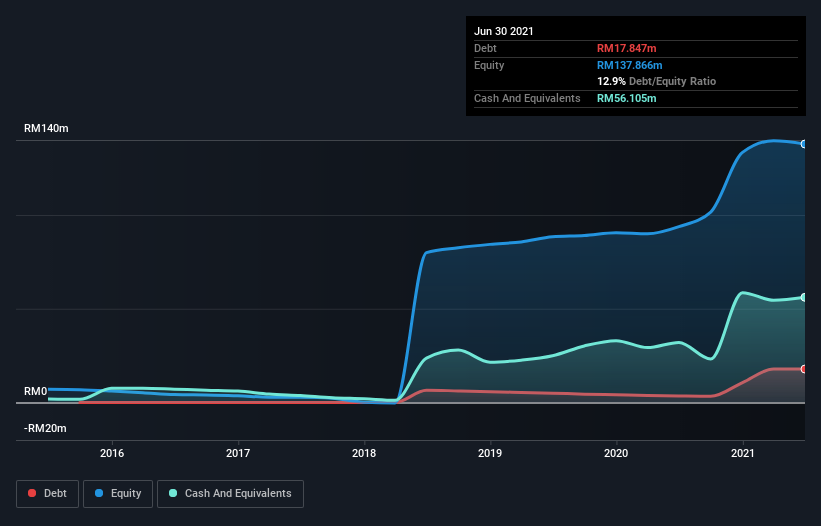RGT Berhad (KLSE:RGTBHD) Has A Pretty Healthy Balance Sheet

Warren Buffett famously said, 'Volatility is far from synonymous with risk.' It's only natural to consider a company's balance sheet when you examine how risky it is, since debt is often involved when a business collapses. As with many other companies RGT Berhad (KLSE:RGTBHD) makes use of debt. But the real question is whether this debt is making the company risky.
What Risk Does Debt Bring?
Generally speaking, debt only becomes a real problem when a company can't easily pay it off, either by raising capital or with its own cash flow. Part and parcel of capitalism is the process of 'creative destruction' where failed businesses are mercilessly liquidated by their bankers. However, a more frequent (but still costly) occurrence is where a company must issue shares at bargain-basement prices, permanently diluting shareholders, just to shore up its balance sheet. Of course, debt can be an important tool in businesses, particularly capital heavy businesses. The first thing to do when considering how much debt a business uses is to look at its cash and debt together.
Check out our latest analysis for RGT Berhad
How Much Debt Does RGT Berhad Carry?
The image below, which you can click on for greater detail, shows that at June 2021 RGT Berhad had debt of RM17.8m, up from RM3.49m in one year. However, it does have RM56.1m in cash offsetting this, leading to net cash of RM38.3m.

A Look At RGT Berhad's Liabilities
According to the last reported balance sheet, RGT Berhad had liabilities of RM19.5m due within 12 months, and liabilities of RM23.1m due beyond 12 months. Offsetting this, it had RM56.1m in cash and RM7.42m in receivables that were due within 12 months. So it can boast RM21.0m more liquid assets than total liabilities.
This surplus suggests that RGT Berhad has a conservative balance sheet, and could probably eliminate its debt without much difficulty. Succinctly put, RGT Berhad boasts net cash, so it's fair to say it does not have a heavy debt load!
Better yet, RGT Berhad grew its EBIT by 104% last year, which is an impressive improvement. If maintained that growth will make the debt even more manageable in the years ahead. The balance sheet is clearly the area to focus on when you are analysing debt. But you can't view debt in total isolation; since RGT Berhad will need earnings to service that debt. So if you're keen to discover more about its earnings, it might be worth checking out this graph of its long term earnings trend.
Finally, a company can only pay off debt with cold hard cash, not accounting profits. While RGT Berhad has net cash on its balance sheet, it's still worth taking a look at its ability to convert earnings before interest and tax (EBIT) to free cash flow, to help us understand how quickly it is building (or eroding) that cash balance. Over the last three years, RGT Berhad reported free cash flow worth 12% of its EBIT, which is really quite low. That limp level of cash conversion undermines its ability to manage and pay down debt.
Summing up
While we empathize with investors who find debt concerning, you should keep in mind that RGT Berhad has net cash of RM38.3m, as well as more liquid assets than liabilities. And we liked the look of last year's 104% year-on-year EBIT growth. So is RGT Berhad's debt a risk? It doesn't seem so to us. There's no doubt that we learn most about debt from the balance sheet. However, not all investment risk resides within the balance sheet - far from it. Be aware that RGT Berhad is showing 5 warning signs in our investment analysis , and 1 of those is a bit concerning...
If you're interested in investing in businesses that can grow profits without the burden of debt, then check out this free list of growing businesses that have net cash on the balance sheet.
New: AI Stock Screener & Alerts
Our new AI Stock Screener scans the market every day to uncover opportunities.
• Dividend Powerhouses (3%+ Yield)
• Undervalued Small Caps with Insider Buying
• High growth Tech and AI Companies
Or build your own from over 50 metrics.
This article by Simply Wall St is general in nature. We provide commentary based on historical data and analyst forecasts only using an unbiased methodology and our articles are not intended to be financial advice. It does not constitute a recommendation to buy or sell any stock, and does not take account of your objectives, or your financial situation. We aim to bring you long-term focused analysis driven by fundamental data. Note that our analysis may not factor in the latest price-sensitive company announcements or qualitative material. Simply Wall St has no position in any stocks mentioned.
Have feedback on this article? Concerned about the content? Get in touch with us directly. Alternatively, email editorial-team (at) simplywallst.com.
About KLSE:RGTBHD
RGT Berhad
An investment holding company, designs, manufactures, and sells moulded plastic products in Malaysia, North America, Europe, other Asian countries, and internationally.
Slight with acceptable track record.
Market Insights
Community Narratives



